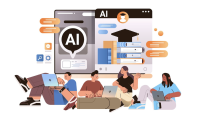Search
There are 7 results.
Tag
Tag
All (27)
Analytics (1)
Assessments (5)
Backwards Design (1)
Belonging (1)
Canvas (1)
Communication (2)
Community (1)
Competency-Based Education (1)
Content Creation (7)
Copyright (1)
Course Maintenance (2)
Course Preparation (3)
Equity (1)
Faculty Presence (1)
Faculty Support (2)
Feedback (1)
Formative Assessments (2)
Generative AI (7)
Grading (2)
Images (1)
Learning Objectives (1)
Multimodality (1)
Peer Review (1)
PowerPoint (1)
Presentations (1)
Revising (1)
Revision (1)
Rubrics (2)
Video (1)
From Mapping to Refining: Prompting Techniques for Generative AI
This piece builds on a previous piece where we explored the importance of keeping your desired outcome in mind when working with generative AI (genAI). We also highlighted the value of including specific data and contextual details in your prompt to align with your goals. If you haven’t read that piece, we recommend starting there:
10 Key Considerations for Online Course Development
Designing and delivering effective online courses requires careful consideration of numerous factors. As a result, it can be difficult to determine where to begin in the process, particularly for course developers and instructors who are new to online learning. This piece presents a curated list of resources aligned with 10 key considerations applicable across academic disciplines and degree programs.
Mapping Generative AI to Tailored Outcomes
Imagine planning a trip to a new city. A quick online search highlights the usual downtown tourist spots, but as you explore more, you uncover unique neighborhoods—a financial district bustling with experts, a hidden restaurant scene, and a college area alive with bookstores and cafés. Yet, none of these appeared in your initial search for “best places to visit.”
The Need to Rethink Assessments in the Age of Generative AI
The rapid advancement of generative artificial intelligence (genAI) technologies has sent shockwaves through the education sector, sparking intense debates about academic integrity, assessment practices, and student learning (Roe et al., 2023; Rudolph et al., 2023; Susnjak & McIntosh, 2024; Swiecki et al., 2022; Yeo, 2023). Since the public release of ChatGPT in November 2022, educators have grappled with concerns about cheating and the potential erosion of traditional academic values (Gorichanaz, 2023; Sullivan et al., 2023). However, as our understanding of genAI capabilities evolves, so too must our approach to assessment and teaching (Lodge et al., 2023).
Administrator Needs: Standardizing Elements of a Digital Learning Program
As an administrator or department chair, you are in a unique position to shape an online program and establish programmatic requirements or recommendations. This is because you have been tasked with taking a broader view of the program, focusing not only on individual course development (as a faculty member might) but also on how an array of courses must be cohesively united to achieve certain goals, values, and accreditation standards. To that end, this piece focuses on why consistency across a program is integral to program quality and student success, and therefore why it falls within your purview to consider standardizing certain elements, requirements, and design choices across all courses in a program.
Developing AI Literacy Across the Curriculum: A Guide for Programs and Faculty
The rapid integration of AI into professional practice across disciplines makes AI literacy increasingly crucial, not just for technology-focused fields but for all areas of study. Even faculty who are skeptical of AI's value need to consider how it's transforming their disciplines. For example, scientific fields are seeing AI adoption in literature reviews, experimental design, and data analysis. In the humanities, AI tools are already being used for textual analysis, translation, and content creation. Creative disciplines must grapple with AI's impact on artistic production and copyright. Professional programs face increasing pressure from employers who expect graduates to understand AI applications in their field.







